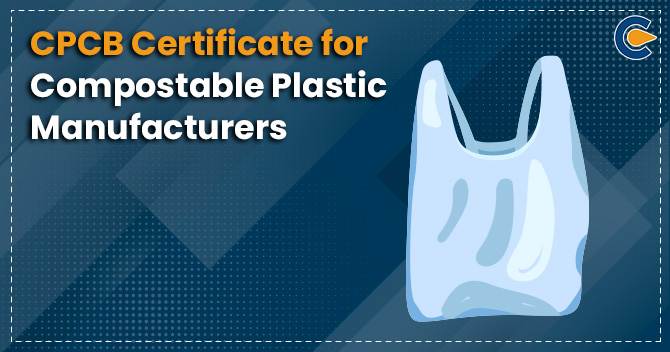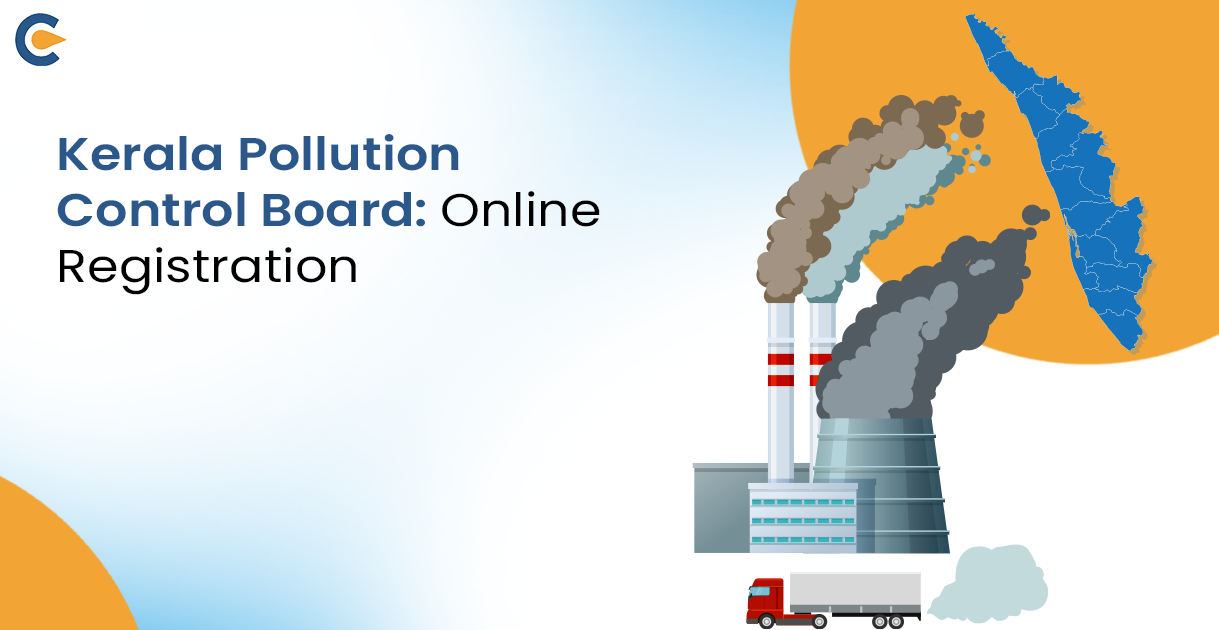The process of issuance of CPCB certificate for compostable plastic manufacturers is given under the Plastic Waste Management Rules, 2016. The manufacturers of the plastic bags must obtain a certificate from the CPCB before marketing such compostable carry bags under Rules 4(h) (conditions) of Plastic Waste Management Rules, 2016.
Introduction to the Compostable Plastic
Compostable plastic is defined as the plastic that undergoes degradation by a biological process during composting to yield Carbon dioxide, water, inorganic compounds and biomass at a rate consistent with other compostable materials and also does not leave visible, distinguishable or toxic residue. The other compostable materials here do not include Petro-based plastics. This definition of Compostable Plastic is defined under Rule 3(e) of Plastic Waste Management Rules, 2016[1].
CPCB Certificate for Compostable Plastic Manufacturers
There is this Standard Operating Process (SOP) for issuance of CPCB Certificate for Compostable Plastic Manufacturers. Rule 4(h) of Plastic Waste Management Rules, 2016, has given the procedure for obtaining such CPCB Certificate for Compostable Plastic Manufacturers. Such a certificate is issued by the Central Pollution Control Board (CPCB). The manufacturer has to obtain this certificate before marketing compostable carry bags. This Standard Operating Process has been modified to facilitate easy filing, uniformity in scrutiny, and maintain transparency during the issuance of this CPCB certificate for Compostable Plastic Manufacturers.
SOP for CPCB Certificate for Compostable Plastic Manufacturers
The Standard Operating Process (SOP) is applicable to all the applications, and the applications are assessed as per the provisions of the SOP. Central Government notified the current SOP on September 10, 2020. The certificates issued by CPCB before the coming of the current SOP are reviewed as per the current SOP within three months from the issue of the current SOP, and if required, necessary actions are taken by the manufacturer or Pollution Control Board or Committee. The SOP has given the following steps for issuance of the CPCB certificate for Compostable Plastic Manufacturers:
Filing of Application
- The manufacturer of compostable plastics applies for registration in Form A along with the requisite documents.
- The documents should be digitally signed. Such digitally signed documents are submitted by email to the CPCB.
- The CPCB assigns an application number and sends a conformity mail to the applicant within three working days of receiving the application.
- An undertaking for registration of Compostable Carry bags on a duly notarized stamp paper of Rs. 100 has to be submitted with the application.
Processing of Application
- The CPCB examines the application and, if any queries arise, then communicates the same to the applicant within seven working days from the receipt of the application.
- The applicant responds to such queries within thirty days of receipt of such query by the CPCB.
- If the applicant fails to respond within thirty days, the application will be considered rejected.
- If the CPCB does not send any response within one month of the receipt of the application, then the certificate is generated.
Issuing of Certificate
- According to Rule 4(h) of Plastic Waste Management Rules, 2016, the certificate must be issued within seven working days from the submission of the application.
- Copy of the CPCB Certificate for the compostable manufacturer is sent to the concerned State Pollution Control Board or Pollution Control Committee.
- If the manufacturing unit does not have registration from State Pollution Control Board or Pollution Control Committee, then the certificate is issued with the condition that the manufacturer shall manufacture the compostable carry bags only after obtaining the valid registration for manufacturing compostable carry bags from the concerned/ appropriate State Pollution Control Board or Pollution Control Committee.
- The registration needs to be submitted to CPCB within three months of issuance of the CPCB Certificate for Compostable Plastic Manufacturer. If the applicant fails to do so, then the certificate will be revoked.
- A provisional certificate is issued in the following cases:
- Interim test report as per the IS/ISO covering the first two components, Disintegration during composting and Ultimate aerobic biodegradation, is submitted.
And a final certificate, in this case, is issued only after the submission of a complete test report of all four components after 180 days.
- If the sample for testing has been sent prior to the grant of Consent to Operate from the concerned State Pollution Control Board or Pollution Control Committee indicating that the sample is manufactured at the unit under consideration. The unit now sends a fresh sample manufactured at the unit for testing after obtaining the provisional certificate.
- And final certificate, in this case, shall be obtained only after the submission of the complete test report.
- The validity of the provisional certificate is six months, and it is extendable by six months. CPCB gives such extension only after considering the reasons of the applicant valid.
- Member Secretary of CPCB approves the authority for issuing the CPCB certificate for Compostable Plastic Manufacturers. The divisional head of CPCB is the designated signatory on such certificate.
- A fresh application is filed in case of any change in raw material or production process or product, and thus, CPCB issues a fresh certificate for the same.
Cancellation of certificate
- The CPCB certificate for the compostable plastic manufacturer is cancelled or suspended by the CPCB if the manufacturer fails to comply with the condition given for issuance of the certificate.
- If the manufacturer violates any provision of the certificate during checking by CPCB or on verification by State Pollution Control Board, a notice is issued by the CPCB.
- Fifteen days from the date of the notice is given to the manufacturer to hear him before considering such cancellation or suspension.
- The decision of such cancellation or suspension by CPCB is intimated within ten working days after the hearing.
- The chairman of CPCB is the final authority for making any decision on cancellation or suspension.
Checklist of Documents for CPCB certificate
The checklist of documents required for the CPCB Certificate for Compostable Plastic Manufacturer are as follows:
- The duly filled Form A for obtaining the certificate from the CPCB for compostable plastic by the manufacturer, including Company details with address, contact number and emails; registration from concerned SPCB or PCC; Production details such as the raw materials used, nature of additive used, manufacturing process with a flow diagram, details of end products and by-products, plant capacity, and test report; consent order from concerned APCB or PCC and details of pollution control measures.
- Registration certificate for the production of compostable plastic bags from the concerned State Pollution Control Board or Pollution Control Committee.
- Consent under Air and Water Act by same concerned Board or committee.
- Flow diagram of the manufacturing process
- Tet report of sample from the designated laboratory.
- Documents supporting the procurement of raw materials and sale of end products
- Details of pollution control measures
- Undertaking letter.
Monitoring Mechanism by the SOP
According to Rule 4(h) of the Rules, 2016, the information related to the name and certificate number of the manufacturer shall be there on each plastic carry bag and multi-layered packaging in case the carry bags are made from the compostable plastic. Such information is printed in English on the bag according to Rule 11(1) of Plastic Waste Management Rules, 2016.
The manufacturer generates a QR code based on details provided in the CPCB certificate for compostable plastic manufacturers. Such QR codes are provided on each carry bag manufactured at such a certified unit. The QR code details are shared with the Central Pollution Control Board, State Pollution Control Board, or the Pollution Control Committee.
The manufacturers provide six-monthly reports with details of raw materials procurement to the concerned State Pollution Control Board or the Pollution Control Committee. Such concerned Board or committee verifies it and forwards its copy to the CPCB. The field verification of such a unit is done by the State Pollution Control Board or the Pollution Control Committee.
A market survey is carried out to ensure the availability of certified compostable carry bags at the consumer end. The SPCB or PCC submits six monthly compliance reports to the CPCB concerning these conditions. The CPCB independently conducts the field verification of the certified units annually and market survey to assess the compliances of the Plastic Waste Management Rules with respect to the manufacture of compostable plastics. And in any case, if the manufacturer is found to be violating the conditions given under the certificate, then such certificate shall stand cancelled.
Conclusion
The Central Government in 2020 notified SOP, Standard Operation Process, for issuance of CPCB certificate for compostable plastic manufacturers. This was done under the provisions of Plastic Waste Management Rules, 2016. According to Rule 4(h) of the said Rules of 2016, the manufacturer of compostable plastic carry bags must obtain such a certificate. There are certain pre-requisite conditions mentioned under the SOP to be followed by the manufacturer to obtain such a certificate. After getting the certificate, the manufacturers become eligible for advertising or selling compostable plastics.
Read our Article:Responsibilities of SPCB in India: Explained











